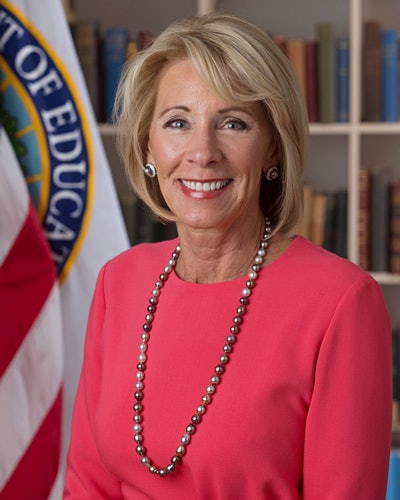WASHINGTON — During her keynote address at the Committee for Economic Development of the Conference Board’s (CED) Fall Policy Conference yesterday, U.S. Secretary of Education Betsy DeVos said that “America’s antiquated approach to education fails too many students.”
The United States was recently ranked 26th overall worldwide for its education system and 55th worldwide for the quality of its math and science education programs, according to the World Economic Forum.
 Betsy DeVos
Betsy DeVos“What we really need is a transformational change in K-12 education,” said DeVos.
DeVos spoke to a crowd of business and education leaders, highlighting opportunities for employers, institutions and K-12 schools to improve the overall education system for students.
In terms of employer roles, DeVos said that they should rethink some of their practices.
She gave the example of skills inflation within job postings, recommending that only skills needed should be listed rather than requiring higher level degrees that are not necessarily essential to the job.
Additionally, DeVos advocated for employers and educators to communicate.
“We have had way too big of walls between education and business and industry,” she added. “And those walls have got to come down. So, I really encourage you to reach out to educators and see how you can partner with them to really meet your students and community’s needs and ultimately, your workforce needs.”
According to Scott Pulsipher, president of Western Governors University and a panel moderator, there are roughly around 3.5 million students in high school. Among those students, there is an 82% completion rate. Two-thirds of those students matriculate into college while an upwards of 25% drop out within the first year.
DeVos said that people need to stop insisting that a traditional four-year degree is “the avenue” for success and discuss the “dignity” of all education pathways.
“Ultimately, we need to encourage many options for students of all ages,” she said. “The result will be a workforce and a nation capable of conquering any challenge and seizing any opportunity.”
For many students who choose to immediately go into the workforce or don’t finish college, it has been found that they often lack basic skills, soft skills and problem-solving skills needed for a “meaningful” career, according to DeVos.
“It is imperative that schools begin to think differently about how they are preparing for students in high school to be prepared for a variety of options,” she said.
She also rejects the idea of “one size fits all” education solutions.
“There should be many education pathways because there are many types of students with many different interests, many types of opportunities with varying requirements,” said DeVos. “We know there are fewer traditional students in higher education today so higher ed needs to be more responsive to all students.”
In terms of her current higher education policies, DeVos spoke of expanding apprenticeship and dual enrollment opportunities, reforming accreditation, opening the federal work-study program to include opportunities that are useful to student’s careers and restoring year-round Pell grants.
She highlighted her Education Freedom Scholarship, which creates a “$5 billion annual federal tax credit for businesses and individuals who voluntarily donate to scholarship granting organizations.”
According to DeVos, the Education Freedom Scholarship would provide more freedom for families to find the right fit for their children’s education.
Throughout the day, the conference hosted other interdisciplinary speakers to discuss the current workforce’s impact on U.S. industry and economic competitiveness.
In terms of workforce preparedness, 40% of college graduates end up in a job that doesn’t require a college degree, according to Oren Cass, senior fellow at the Manhattan Institute.
“Leveling the playing field, to say you know what, for some people, [college] is absolutely the path that makes sense,” he said. “For others, most people, that isn’t the path that makes the most sense.”
 Oren Cass
Oren CassCass said that compared to the United States, other countries spend a lot more money on other types of training. Additionally, in most countries, roughly two-thirds of high school students are on non-college pathways.
“It really has to start there,” he said. “Not with, we are going to walk across their high school football stadium stage, hand them their diploma and say ‘oops, we prepared a third of you well for college and two-thirds of you we are not sure.’ But actually, how do we build pathways for students more likely to succeed not going down a college track and where there really is all this other demand.”
Additionally, another panel focused on the impact of early childhood education on the future of the workforce.
Garrett Bauman, senior manager of public policy at Teaching Strategies, quoted statistics from the American Journal for Public Health. From their recent study, it was found that children’s skills were predictive of academic, economic and social outcomes into early adulthood.
The study was based on the rating of a child’s social and emotional skills in kindergarten. For every one-point increase on a five-point scale, the child was twice as likely to earn a college degree, 54% more likely to earn a high school diploma and 46% more likely to hold a full-time job.
However, for every one-point decrease, a child was 67% more likely to have been arrested and 82% more likely to be in or on a waiting list for public housing.
“These are horrifying and terrifying numbers,” said Bauman. “And we need to make sure that we are thinking through the changing landscape in this country of why children need high quality support at an early age.”
Following DeVos’ speech, other sessions focused on U.S. and China relations, the current political climate and policy issues.
Sarah Wood can be reached at [email protected].















